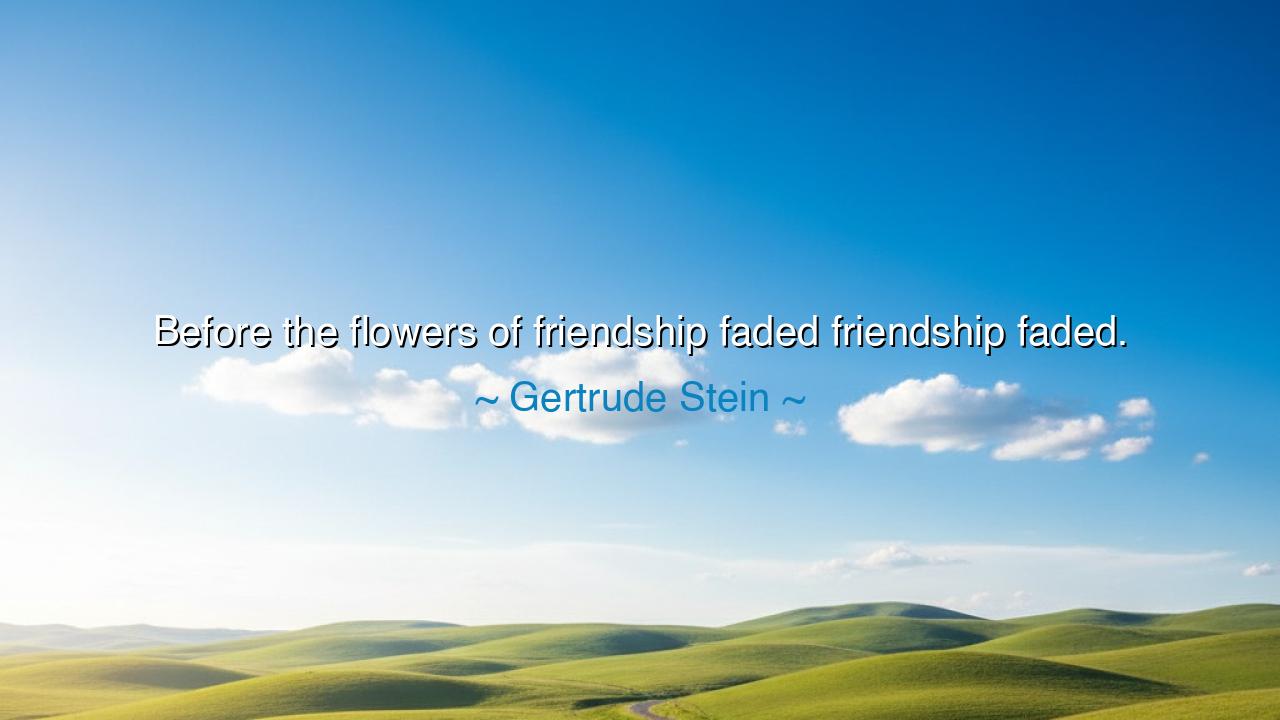
Before the flowers of friendship faded friendship faded.






In the enigmatic and mournful words of Gertrude Stein, the modern sage of rhythm and reflection, there lingers a sorrow that transcends the passage of time: “Before the flowers of friendship faded, friendship faded.” Though her words are brief, they unfold like petals of grief and understanding. She speaks not merely of friendship lost, but of the tragedy that often accompanies the slow death of affection — the quiet fading of what was once radiant and alive. Stein, whose pen captured both the chaos and the tenderness of human connection, reminds us that even the most beautiful bonds, if neglected, can wither before we realize they are dying.
The origin of this quote lies within Stein’s poetic and philosophical prose, written in a time of deep reflection during the early twentieth century. Living through the tumult of modernism, she was surrounded by artists, thinkers, and companions — among them Picasso, Hemingway, and Alice B. Toklas — whose friendships were as fiery as they were fragile. In her circles, loyalty and admiration often dissolved into rivalry and silence. It was from this world of fleeting alliances and intense intimacy that she penned this lament. Her line, spare yet haunting, captures the human ache of realizing that the spirit of a friendship has faded long before its outer gestures — the flowers — have wilted.
To say that “before the flowers of friendship faded, friendship faded” is to see the distinction between the appearance of love and its essence. The flowers — the tokens of affection, the visits, the kind words, the shared laughter — may still linger like the last blossoms of spring. Yet behind them, the roots have already died. The heart that once bloomed with warmth has grown cold, though its outward form remains. Stein teaches us that the death of friendship is often silent, unseen — that by the time the petals fall, the life within them has long departed. This is the sorrow of all things human: that endings often begin long before we notice them.
The ancients, too, understood this truth. The philosopher Aristotle once wrote that friendship requires constant tending, like a garden. When neglected, even the noblest friendship decays — not through malice, but through indifference. Consider the story of Julius Caesar and Brutus, whose bond was once one of trust and admiration. For years, Caesar saw in Brutus not merely an ally but a reflection of himself. Yet over time, ambition and mistrust crept between them, unseen. By the time the fatal betrayal came, the friendship had long faded, though the outward courtesies remained. The flowers — the gestures of respect, the appearances of loyalty — still stood, but their fragrance was gone. Thus, history itself repeats the wisdom of Stein’s words: that what dies first in friendship is not the act, but the spirit.
Gertrude Stein’s insight is not a condemnation of friendship, but a call to cherish it. She warns us that bonds between souls are living things, delicate and easily lost. When friendship begins to fade, it does not do so in thunder or storm, but in the small absences — the unreturned letter, the unspoken word, the quiet neglect of the heart. We must therefore be vigilant gardeners of our relationships, watering them with attention, truth, and care. For once the flowers fade, they may never bloom again.
There is a gentler example from Stein’s own life — her lifelong companionship with Alice B. Toklas, the woman who shared her home and her heart. Their friendship, which deepened into love, endured decades of war, exile, and artistic struggle. Yet even they knew the fragility of connection. Stein once wrote of how easy it is to take love for granted — to assume that its blossoms will last forever. But their endurance was proof that friendship, tended with devotion and honesty, can defy time. She understood that the beauty of any bond lies not in its first bloom, but in the daily act of keeping it alive.
So, my child, take this teaching of Gertrude Stein and hold it close: do not let your friendships fade before you see their fading. Do not wait until the flowers wither to remember their fragrance. Speak when silence grows heavy. Forgive before resentment hardens the heart. Visit those who have become distant, and tell them that you still care. Friendship, like life, demands renewal — and neglect is its quiet undoing.
For in the end, Stein’s sorrowful line is also a hidden prayer. It is a plea that we might awaken before it is too late — that we might tend the gardens of our hearts while the flowers still bloom. Friendship, she tells us, is not lost in a single moment; it is lost in the moments when we stop seeing, stop listening, stop nurturing what was once alive. Let us, then, live more attentively, love more deliberately, and keep alive the friendships that give our days their fragrance — before the flowers fade, and with them, the friendship itself.






AAdministratorAdministrator
Welcome, honored guests. Please leave a comment, we will respond soon